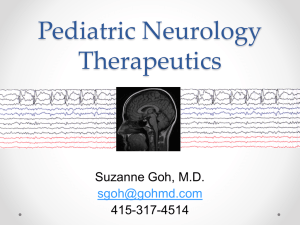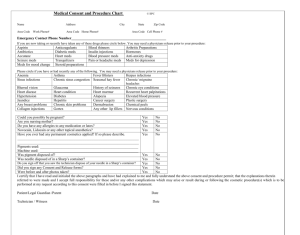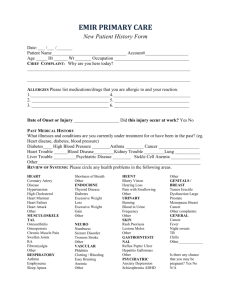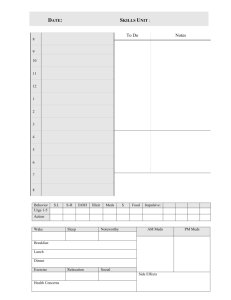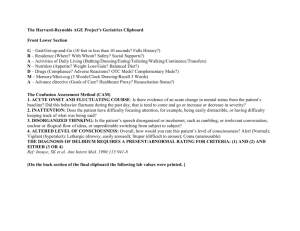Mild Moderate Severe •Needs occasional cueing (<50% of the
advertisement
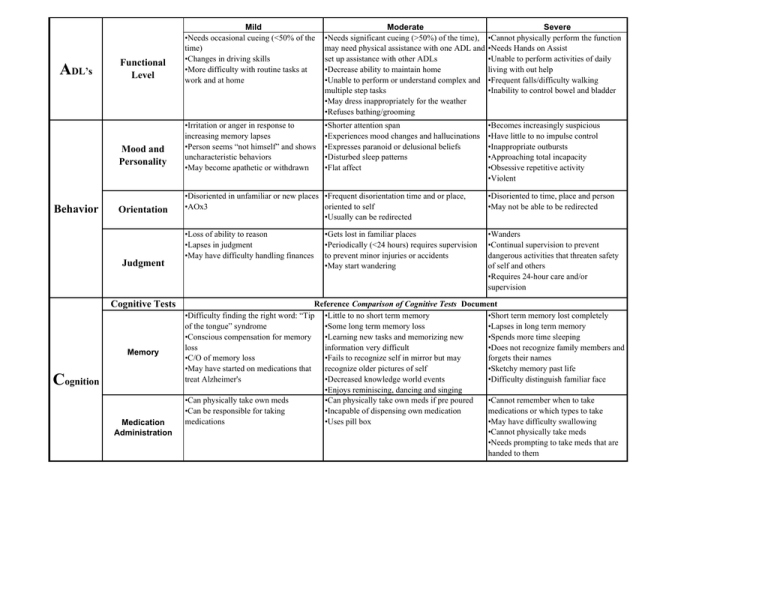
ADL’s Functional Level Mood and Personality Behavior Orientation Judgment Cognitive Tests Memory Cognition Medication Administration Mild •Needs occasional cueing (<50% of the time) •Changes in driving skills •More difficulty with routine tasks at work and at home Moderate •Needs significant cueing (>50%) of the time), may need physical assistance with one ADL and set up assistance with other ADLs •Decrease ability to maintain home •Unable to perform or understand complex and multiple step tasks •May dress inappropriately for the weather •Refuses bathing/grooming Severe •Cannot physically perform the function •Needs Hands on Assist •Unable to perform activities of daily living with out help •Frequent falls/difficulty walking •Inability to control bowel and bladder •Irritation or anger in response to increasing memory lapses •Person seems “not himself” and shows uncharacteristic behaviors •May become apathetic or withdrawn •Shorter attention span •Experiences mood changes and hallucinations •Expresses paranoid or delusional beliefs •Disturbed sleep patterns •Flat affect •Becomes increasingly suspicious •Have little to no impulse control •Inappropriate outbursts •Approaching total incapacity •Obsessive repetitive activity •Violent •Disoriented in unfamiliar or new places •Frequent disorientation time and or place, •AOx3 oriented to self •Usually can be redirected •Disoriented to time, place and person •May not be able to be redirected •Loss of ability to reason •Lapses in judgment •May have difficulty handling finances •Wanders •Continual supervision to prevent dangerous activities that threaten safety of self and others •Requires 24-hour care and/or supervision •Gets lost in familiar places •Periodically (<24 hours) requires supervision to prevent minor injuries or accidents •May start wandering Reference Comparison of Cognitive Tests Document •Difficulty finding the right word: “Tip •Little to no short term memory •Short term memory lost completely of the tongue” syndrome •Lapses in long term memory •Some long term memory loss •Conscious compensation for memory •Spends more time sleeping •Learning new tasks and memorizing new loss •Does not recognize family members and information very difficult •C/O of memory loss forgets their names •Fails to recognize self in mirror but may •May have started on medications that •Sketchy memory past life recognize older pictures of self treat Alzheimer's •Difficulty distinguish familiar face •Decreased knowledge world events •Enjoys reminiscing, dancing and singing •Can physically take own meds •Can physically take own meds if pre poured •Cannot remember when to take •Can be responsible for taking •Incapable of dispensing own medication medications or which types to take medications •Uses pill box •May have difficulty swallowing •Cannot physically take meds •Needs prompting to take meds that are handed to them
